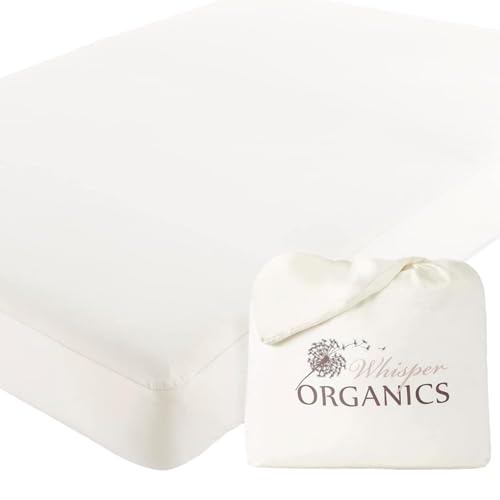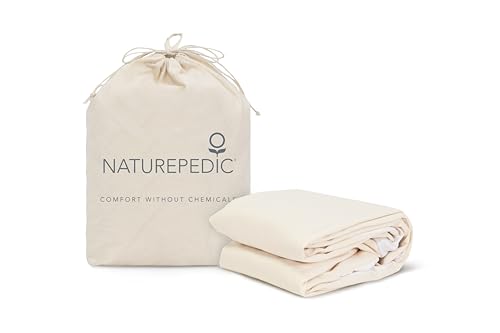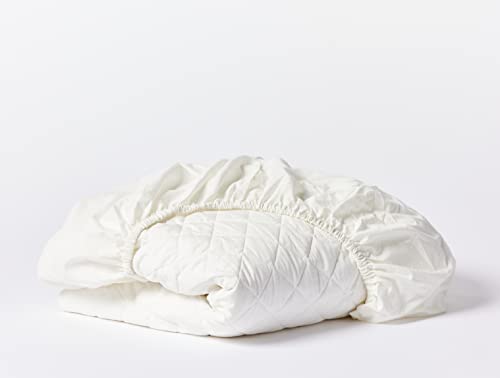Disclosure
This website is a participant in the Amazon Services LLC Associates Program, an affiliate advertising program designed to provide a means for us to earn fees by linking to Amazon.com and affiliated sites.
Introduction
Organic mattress protectors are bedding covers made from natural, chemical-free materials designed to shield your mattress from moisture, allergens, dust mites, and wear—without compromising your health or the environment.
Think about this: you spend roughly one-third of your life sleeping. Shouldn’t your sleeping environment be as clean and safe as possible? Conventional mattress protectors often contain synthetic fabrics, chemical finishes, or plastic linings that can off-gas volatile organic compounds (VOCs). In contrast, organic mattress protectors use certified organic cotton, wool, or bamboo—materials grown and processed without harmful pesticides or toxins.
These protectors cater to eco-conscious individuals, families with sensitive skin or allergies, or anyone looking to reduce their exposure to unnecessary chemicals. But do they really perform well? And are they worth the often higher price tag?
Best Organic Mattress Protectors for Healthy Sleep
If you’re considering an organic mattress protector, choosing a reputable, high-quality product makes all the difference. Here are three of the best organic mattress protectors available today:
1. Organic Mattress Protector Pad
- Consciously Crafted: We’re proud to offer a certified organic mattress protector…
- Rest in Confidence: Experience a comfortable waterproof mattress topper with…
- Carefully Constructed: Our heavy duty waterproof mattress protector is machine…
- Made with 100% GOTS-certified organic cotton, it’s breathable, soft, and non-toxic—ideal for eco-conscious buyers seeking comfort and safety without compromising performance.
2.Naturepedic Organic Waterproof Mattress Protector
- Waterproof Mattress Pad: Protect and keep your mattress free of liquids and…
- Organic Cotton: Our mattress protectors are made with two layers of organic…
- Drysleep Technology: Ultra-thin waterproof barrier effectively blocks liquids…
- Combines organic cotton with a food-grade waterproof barrier for effective moisture protection. A top choice for parents, allergy sufferers, and those with sensitive skin.
3.Coyuchi Organic Crinkled Percale Mattress Protector
- GOTS + MADE SAFE – Coyuchi’s organic cotton mattress pad is constructed of…
- BENEFITS – The value of a good mattress pad will help extend the life of your…
- MEASUREMENTS – A deep 15” pocket with full elastic around the bottom provides…
- Ethically made from sustainably sourced organic cotton with a crinkled texture for breathability. It’s perfect for hot sleepers who want moisture control without synthetic layers.
What Makes a Mattress Protector Organic?
To be considered organic, a mattress protector must meet strict standards concerning how the materials are grown, processed, and manufactured—without the use of harmful chemicals, synthetic additives, or genetically modified organisms.
Key Characteristics of Organic Mattress Protectors
- GOTS Certification (Global Organic Textile Standard)
- This is the gold standard in organic textiles. It ensures that:
- At least 95% of the material is organic.
- No toxic dyes, bleaches, or chemical finishes are used.
- Ethical labor practices and eco-friendly production methods are followed.
- This is the gold standard in organic textiles. It ensures that:
- Natural, Chemical-Free Materials
- Common organic materials include:
- Organic Cotton – Breathable, hypoallergenic, and soft.
- Organic Wool – Naturally moisture-wicking and resistant to dust mites.
- Bamboo (when certified organic) – Silky feel with natural antimicrobial properties.
- Common organic materials include:
- No VOCs or Flame Retardants
- Organic mattress protectors avoid chemical treatments that release VOCs (volatile organic compounds), which are often found in conventional bedding and can cause respiratory or skin irritation.
How to Identify a Genuine Organic Protector
- Look for certifications like:
- GOTS
- OEKO-TEX Standard 100 (tests for harmful substances, not necessarily organic)
- Greenguard Gold (ensures low chemical emissions)
- Read the label and verify:
- The percentage of organic material
- Whether synthetic blends or waterproofing chemicals are used
Benefits of Using an Organic Mattress Protector
Switching to an organic mattress protector is more than just a green lifestyle upgrade—it’s a health-conscious and comfort-driven decision. Let’s break down the advantages that make these protectors worth considering.
Health and Wellness Benefits
- Hypoallergenic
- Ideal for those with allergies, asthma, or sensitive skin.
- Resists dust mites, mold, and bacteria naturally—without chemical treatments.
- No Off-Gassing
- Conventional protectors may release VOCs that irritate lungs or skin.
- Organic options are free from flame retardants, PVC, and formaldehyde.
- Safe for Babies and Children
- Since kids are more sensitive to toxins, organic protectors are a safe, gentle choice for cribs and kids’ beds.
Environmental Sustainability
- Eco-Friendly Materials
- Grown without pesticides or synthetic fertilizers.
- Biodegradable and renewable—unlike polyester or plastic-based protectors.
- Low-Impact Manufacturing
- Many certified organic products are produced with water-saving and waste-reducing practices.
Comfort and Durability
- Breathability
- Organic cotton and wool allow better airflow, helping regulate body temperature throughout the night.
- Moisture-Wicking & Waterproof Options
- Some organic protectors come with natural waterproofing layers (like food-grade polyurethane or wool) without losing breathability.
- Long-Lasting Quality
- Higher durability due to better materials and stitching practices—worth the upfront investment.
Ethical Considerations
- Fair Labor Practices
- Certified products usually come from fair-wage environments.
- Cruelty-Free
- Wool is often ethically sourced with animal welfare standards in place.
Are Organic Mattress Protectors Worth the Price?
Organic mattress protectors often come with a higher price tag—but is the cost justified? Let’s take a closer look at why they may be worth every penny for the right buyer.
Long-Term Value vs. Short-Term Cost
- Initial investment:
- Typically priced between $80–$200, depending on size and brand.
- This is 2–3x the cost of conventional protectors.
- Durability:
- Organic materials like cotton and wool tend to last longer, resist wear, and wash well over time.
- Lower replacement frequency = more savings long-term.
Health and Wellness Trade-Offs
- Lower exposure to chemicals:
- Priceless if you have allergies, asthma, or chemical sensitivities.
- Many users report fewer skin irritations and improved sleep quality.
- Peace of mind:
- Knowing your sleeping environment is toxin-free is a huge comfort—especially for parents or those with health concerns.
Environmental and Ethical Impact
- Sustainably made:
- Your dollars support sustainable farming, reduced water usage, and cleaner air.
- Ethical practices:
- Often manufactured under fair-trade, cruelty-free conditions.
When It’s Not Worth It
- If you’re on a tight budget:
- Look for hybrid options—products that blend affordability with some organic elements.
- Short-term stays or temporary beds:
- For guest rooms or infrequent use, a conventional protector may suffice.
Verdict:
Yes, organic mattress protectors are worth it if you prioritize health, sustainability, and long-term value. Think of them as an investment in your well-being, not just your bedding.
How to Choose the Right Organic Mattress Protector for You
With so many options available, picking the best organic mattress protector can feel overwhelming. The right choice depends on your specific needs, preferences, and budget. Here’s a simple guide to help you make a confident, informed decision.
Consider Your Sleep Environment
- Do you sweat at night?
- Look for breathable options like organic cotton percale or moisture-wicking wool.
- Do you have allergies?
- Choose hypoallergenic protectors made without chemical treatments or synthetic blends.
- Do you need waterproofing?
- Opt for products with a food-grade polyurethane backing (like Naturepedic) or naturally water-resistant wool.
Check for Certifications
Always verify third-party certifications to ensure the protector is genuinely organic and non-toxic:
- GOTS (Global Organic Textile Standard) – Ensures organic farming and safe production.
- OEKO-TEX Standard 100 – Tests for harmful substances, even in non-organic materials.
- Greenguard Gold – Guarantees low emissions and cleaner indoor air.
Assess Fit and Compatibility
- Size accuracy:
- Make sure it matches your mattress size and depth. Some protectors are deep-pocketed for plush or hybrid mattresses.
- Elastic design:
- Fitted-sheet styles are best for secure placement. Elastic all around ensures a snug fit.
Maintenance Requirements
- Is it machine-washable?
- Most organic cotton protectors are easy to launder. Wool may require spot-cleaning or dry cleaning.
- Drying needs:
- Check for low-heat tumble dry compatibility if you prefer machine drying.
Budget Considerations
- Premium options:
- Brands like Avocado and Naturepedic offer full organic certification and high durability.
- Mid-range hybrids:
- Look for OEKO-TEX-certified blends if you’re on a budget but still want better-than-average safety.
Organic vs. Non-Organic Mattress Protectors: Key Differences
When it comes to protecting your mattress, both organic and non-organic protectors serve the same basic function. However, they differ drastically in terms of materials, safety, environmental impact, and long-term value.
Here’s a side-by-side breakdown to help you decide what truly fits your lifestyle:
Material Composition
- Organic Protectors
- Made from certified organic cotton, wool, or bamboo.
- Free from synthetic dyes, finishes, or pesticides.
- Non-Organic Protectors
- Often made from polyester, vinyl, or synthetic blends.
- May include chemical waterproofing layers and flame retardants.
Health and Safety
- Organic
- Hypoallergenic and breathable.
- No off-gassing or skin-irritating chemicals.
- Non-Organic
- Can emit VOCs (volatile organic compounds).
- May trigger allergies or sensitivities in sensitive individuals.
Environmental Impact
- Organic
- Biodegradable and sustainably farmed.
- Lower carbon and water footprint.
- Non-Organic
- Petroleum-based materials contribute to pollution.
- Often non-recyclable and not biodegradable.
Comfort and Performance
- Organic
- Naturally breathable and temperature regulating.
- Some models offer quiet, waterproof protection without the crinkle sound.
- Non-Organic
- May retain heat and moisture.
- Can be noisy due to plastic linings.
Cost
- Organic
- Higher upfront cost ($80–$200+), but better long-term durability.
- Non-Organic
- Budget-friendly ($20–$60), but often needs replacement sooner.
Conclusion
Choosing an organic mattress protector is about more than just covering your bed—it’s about protecting your health, the environment, and your peace of mind. These protectors:
- Use natural, chemical-free materials.
- Offer hypoallergenic, breathable comfort.
- Reduce exposure to harmful substances.
- Support ethical and sustainable production.
While they may cost more upfront, their durability, safety, and environmental benefits make them a smart long-term investment—especially for families, allergy sufferers, and eco-conscious consumers.
Frequently Asked Questions About Organic Mattress Protectors
Are organic mattress protectors really safer than regular ones?
Yes. Organic protectors avoid toxic chemicals like formaldehyde, flame retardants, and synthetic waterproofing agents commonly found in traditional protectors. They’re hypoallergenic, non-toxic, and ideal for sensitive skin.
Can an organic mattress protector be waterproof?
Absolutely. Many organic protectors use:
- Food-grade polyurethane (non-toxic and safe)
- Natural wool (naturally moisture-resistant)
These options provide protection without compromising breathability or safety.
Do they feel different from standard mattress protectors?
- Organic cotton offers a softer, more breathable feel than synthetic fabrics.
- Wool adds a cozy, slightly cushioned texture.
- They’re often quieter, with less “crinkle” noise compared to vinyl-backed protectors.
How do I wash and care for an organic mattress protector?
Care instructions vary:
- Most organic cotton protectors are machine washable with cold or warm water and low heat drying.
- Wool-based protectors may require:
- Spot cleaning
- Air drying
- Occasional dry cleaning
Always check the label before washing.
Are they worth the extra cost?
If you:
- Have allergies or skin sensitivities
- Want to reduce chemical exposure
- Care about environmental sustainability
Then yes—organic mattress protectors are worth the investment.
Can I use one with a memory foam mattress?
Yes. Just ensure the protector has deep pockets or stretch corners to fit snugly over thicker mattresses like memory foam or hybrids.



